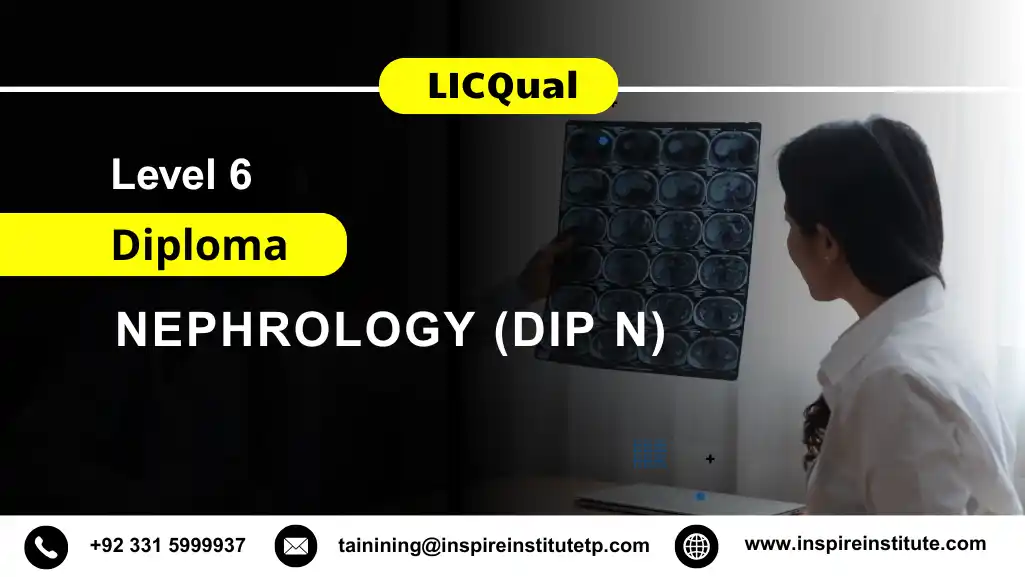LICQual Level 6 Diploma in Nephrology (Dip N)
The LICQual Level 6 Diploma in Nephrology (Dip N) is a prestigious UK-accredited qualification designed for healthcare professionals, nephrology practitioners, and medical graduates seeking to advance their expertise in kidney health, renal diseases, and clinical nephrology. In an era where chronic kidney disease and renal complications are increasing globally, this diploma provides the critical knowledge and practical skills required to address complex nephrological challenges effectively.
This Diploma in Nephrology focuses on developing a strong foundation in renal anatomy, physiology, and pathology while exploring the latest diagnostic and therapeutic approaches in nephrology. Learners gain comprehensive insight into conditions such as acute kidney injury, chronic kidney disease, electrolyte imbalances, and renal replacement therapy. Through a combination of theoretical learning and applied research, the course prepares participants to manage renal disorders with precision and confidence.
Upon completion, graduates of the LICQual Diploma in Nephrology will be equipped to pursue specialized roles such as Nephrology Specialist, Clinical Consultant, Research Coordinator, or Lecturer in medical and academic institutions. The course also serves as a pathway to advanced postgraduate studies or subspecialty training in nephrology and renal sciences.
The LICQual Level 6 Diploma in Nephrology (Dip N) enhances professional credibility, clinical expertise, and global career prospects. It empowers healthcare professionals to lead innovations in renal medicine, improve patient outcomes, and contribute to the advancement of nephrology worldwide through evidence-based, ethical, and patient-focused practices.
Why Choose this Qualification
The LICQual Level 6 Diploma in Nephrology (Dip N) is a UK-accredited professional qualification that empowers healthcare practitioners, nephrology specialists, and aspiring clinicians with advanced knowledge and skills in kidney health and renal medicine. This assignment-based program bridges theoretical understanding with real-world clinical applications, preparing learners to manage, diagnose, and treat complex renal conditions effectively. Through evidence-based education and flexible learning pathways, the course ensures participants gain internationally recognised expertise to advance their careers and contribute meaningfully to global nephrology practices.
Key Reasons to Choose this Qualification
Specialist Knowledge in Renal Medicine
- Gain in-depth understanding of kidney anatomy, physiology, and pathophysiology.
- Learn to diagnose and manage renal disorders such as chronic kidney disease, nephrotic syndrome, and renal failure.
- Explore the mechanisms and treatment of electrolyte imbalances and fluid management.
- Build expertise in nephrological pharmacology, including dialysis and transplant medications.
Practical Clinical Application
- Apply knowledge through clinical case studies, research projects, and scenario-based learning.
- Develop practical diagnostic and treatment planning skills for real-world nephrology cases.
- Learn to interpret renal function tests, imaging results, and patient histories effectively.
- Integrate theory with evidence-based clinical practices to improve patient outcomes.
Internationally Recognised Qualification
- Achieve a UK-accredited diploma that meets global healthcare and education standards.
- Strengthen your professional credibility in nephrology and medical sciences.
- Expand career opportunities in hospitals, research institutes, and higher education sectors.
- Demonstrate competency and leadership aligned with international medical benchmarks.
Evidence-Based and Research-Oriented Learning
- Engage with the latest scientific research, clinical studies, and nephrology innovations.
- Develop analytical and critical thinking skills for clinical decision-making.
- Learn to evaluate research papers and apply findings to real patient scenarios.
- Promote the adoption of best practices and ethical standards in renal healthcare.
Flexible and Career-Friendly Learning Structure
- Study through an assignment-based format tailored for working medical professionals.
- Manage your studies alongside clinical duties with flexible pacing and online support.
- Access digital resources, expert mentorship, and structured academic guidance.
- Enjoy self-directed learning while maintaining a strong link to clinical application.
Career Advancement and Global Opportunities
- Prepare for roles such as Nephrology Specialist, Clinical Researcher, or Healthcare Educator.
- Open pathways to postgraduate and specialist training in renal sciences.
- Strengthen leadership and communication skills essential for multidisciplinary healthcare teams.
- Gain recognition as a qualified nephrology professional on an international level.
Focus on Patient-Centred and Ethical Care
- Learn to provide compassionate, evidence-based, and ethical nephrology care.
- Enhance your ability to communicate with patients and support holistic treatment approaches.
- Understand the psychosocial impact of renal diseases and design supportive interventions.
- Promote long-term kidney health through preventive care and lifestyle management education.
Continuous Professional Development
- Stay updated with evolving nephrology standards and technological advancements.
- Build resilience and adaptability to address emerging renal healthcare challenges.
- Foster reflective practice and lifelong learning for ongoing professional growth.
- Contribute to public health initiatives and kidney care awareness programs.
The LICQual Level 6 Diploma in Nephrology (Dip N) offers a comprehensive learning experience that enhances both professional and clinical capabilities. By combining academic excellence, practical application, and ethical practice, this qualification equips learners to become competent nephrology professionals dedicated to advancing kidney care and improving patient well-being on a global scale.ffers a measurable impact on professional development, clinical competence, and healthcare excellence globally.
Course Overview
LICQual UK Awarding Body
Average Completion Time:
6-24 Months
Study Units: 6 Units
Evidence & Assignment Based
Mandatory Units
Who Should Take This Course
The LICQual Level 6 Diploma in Nephrology (Dip N) is a prestigious UK-accredited qualification designed for medical professionals and healthcare practitioners seeking to enhance their expertise in renal health, kidney care, and nephrology practice. This advanced diploma integrates scientific knowledge with real-world clinical applications, preparing learners to effectively diagnose, manage, and treat kidney-related disorders. It also offers a flexible learning structure ideal for working professionals aiming to advance their careers while maintaining active engagement in the healthcare sector.
This course is suitable for
Medical Doctors and Physicians
- Designed for doctors aiming to specialize in nephrology or expand their understanding of renal diseases.
- Provides in-depth knowledge of kidney function, pathophysiology, and clinical management.
- Strengthens diagnostic and decision-making skills essential for nephrological practice.
- Equips physicians to design evidence-based treatment plans and lead renal healthcare initiatives.
Nephrology Nurses and Dialysis Technicians
- Ideal for registered nurses and dialysis professionals seeking specialized training in kidney care.
- Enhances skills in managing dialysis procedures, monitoring patients, and handling emergencies.
- Builds competence in patient education, ethical care, and interdisciplinary collaboration.
- Provides the theoretical and practical knowledge needed for leadership roles in nephrology units.
Clinical Researchers and Medical Scientists
- Perfect for individuals involved in nephrology research and clinical trials.
- Offers tools to design, conduct, and evaluate research focused on kidney diseases and treatments.
- Encourages evidence-based thinking and application of scientific data to real-world clinical challenges.
- Expands analytical and reporting skills essential for publishing and contributing to global nephrology studies.
Allied Health Professionals
- Suitable for healthcare practitioners working in medical imaging, laboratory diagnostics, or pharmacy.
- Provides a deep understanding of nephrological pharmacology, renal diagnostics, and clinical indicators.
- Develops interdisciplinary communication and collaboration for effective patient management.
- Equips learners to support nephrology teams through accurate data interpretation and technical expertise.
Healthcare Managers and Administrators
- Beneficial for professionals overseeing nephrology departments or hospital renal programs.
- Teaches strategic planning and resource management for efficient kidney care delivery.
- Enhances leadership, communication, and ethical decision-making in clinical environments.
- Equips administrators with the skills to implement quality improvement systems in renal care settings.
Public Health Specialists and Health Educators
- Suitable for professionals focused on community health, prevention, and awareness programs.
- Enables the design and delivery of kidney disease prevention initiatives at a population level.
- Builds skills in data analysis, health promotion, and epidemiological reporting.
- Promotes advocacy for early diagnosis, lifestyle improvement, and sustainable renal health programs.
Medical Graduates and Aspiring Nephrology Specialists
- Ideal for graduates aiming to pursue advanced clinical or academic careers in nephrology.
- Provides foundational and specialist knowledge to prepare for postgraduate training.
- Develops analytical and research skills aligned with international medical education standards.
- Builds confidence and professional readiness for entry into nephrology-focused roles.
International Healthcare Professionals
- Tailored for global medical practitioners seeking UK-recognized nephrology qualifications.
- Offers cross-cultural competence in renal healthcare and global medical standards.
- Facilitates career mobility by meeting international benchmarks in clinical nephrology.
- Encourages collaboration with global nephrology networks and professional associations.
In conclusion, the LICQual Level 6 Diploma in Nephrology (Dip N) is ideally suited for professionals dedicated to advancing their understanding of kidney health and improving patient outcomes. Whether you are a physician, nurse, researcher, or healthcare manager, this qualification empowers you with the expertise, practical skills, and ethical framework required to excel in nephrology practice and contribute meaningfully to the global healthcare community.
Course Benefits
The LICQual Level 6 Diploma in Nephrology (Dip N) is a UK-accredited qualification designed for healthcare professionals, nephrology practitioners, and aspiring clinical leaders who aim to deepen their expertise in diagnosing, managing, and treating kidney-related diseases. This comprehensive, assignment-based Diploma in Nephrology combines theoretical knowledge with practical applications, preparing learners to design, implement, and evaluate effective renal care strategies. Through evidence-based learning and flexible study pathways, this qualification equips professionals to deliver high-quality nephrology services, enhance patient outcomes, and contribute to advancements in renal healthcare practice.
Key Benefits of the Course
- Specialist Knowledge:
Learners gain an advanced understanding of kidney anatomy, physiology, and pathology. The course covers essential areas such as chronic kidney disease (CKD), acute renal failure, dialysis, and renal transplantation. It also delves into diagnostic procedures, pharmacological treatments, and nephrology-related surgical approaches, ensuring learners can confidently manage complex renal cases. - Practical Application:
The Diploma in Nephrology focuses on real-world medical applications through clinical case studies, diagnostic simulations, and research assignments. Learners develop essential skills in patient assessment, disease management, and multidisciplinary collaboration. The course promotes evidence-based practice in nephrology, empowering participants to deliver effective, patient-centred care. - Recognised Qualification:
The LICQual Level 6 Diploma in Nephrology (Dip N) is an internationally recognised qualification that affirms professional competence and clinical expertise. This UK-accredited diploma enhances learners’ credibility and employability, opening opportunities in hospitals, dialysis units, academic institutions, and global healthcare organisations. - Flexible Learning Pathway:
This programme is designed with flexibility for working healthcare professionals, allowing learners to balance study with professional commitments. Its assignment-based structure provides self-paced progress supported by expert tutors, interactive online learning resources, and structured mentorship. - Evidence-Based Training:
The course emphasises evidence-based clinical practice by integrating the latest nephrology research, international guidelines, and emerging technologies. Learners are trained to apply scientific principles to diagnostics, treatment planning, and renal care, ensuring high standards of clinical decision-making and patient management. - Career Development:
Graduates of the LICQual Level 6 Diploma in Nephrology can pursue diverse career paths in hospitals, renal research centres, dialysis units, and academic environments. This qualification supports advancement into roles such as Nephrology Specialist, Dialysis Unit Manager, Clinical Researcher, or Medical Educator, while also serving as a foundation for postgraduate or specialised nephrology training. - Enhanced Patient Impact:
The programme prepares professionals to provide safe, ethical, and compassionate care to individuals suffering from renal conditions. It promotes improved patient quality of life through effective clinical management, sustainable healthcare practices, and culturally sensitive communication in diverse medical settings. - Professional Growth:
Learners strengthen critical thinking, clinical reasoning, communication, and leadership skills essential to the nephrology field. The course encourages reflective learning, continuous professional development, and collaboration within multidisciplinary healthcare teams. Graduates emerge as capable, confident professionals contributing to the global advancement of nephrology.
The LICQual Level 6 Diploma in Nephrology (Dip N) empowers healthcare professionals with the advanced clinical knowledge, practical expertise, and leadership abilities needed to excel in renal medicine. This qualification enhances professional standing, broadens career prospects, and contributes to improved kidney healthcare delivery and patient outcomes worldwide.
Eligibility Criteria
The LICQual Level 6 Diploma in Nephrology (Dip N) is a UK-accredited qualification designed for healthcare professionals, nephrology practitioners, and aspiring medical specialists seeking to advance their expertise in kidney care, diagnostics, and treatment. This assignment-based diploma integrates theoretical principles with practical applications, preparing learners to assess, plan, implement, and evaluate renal healthcare programs and patient management strategies effectively.
Educational Background:
Applicants should hold a recognised qualification in medicine, nursing, healthcare, or a related nephrology or clinical discipline. A Level 5 diploma or an equivalent qualification in healthcare management, clinical sciences, or similar fields is also acceptable. Candidates with international qualifications in medicine, nephrology, or allied health disciplines will be individually assessed to ensure they meet UK academic and professional equivalency standards.
Professional Experience:
A minimum of one year of professional experience in healthcare, clinical practice, nephrology, or a related medical field is recommended. Prior experience in patient care, dialysis assistance, renal assessment, or hospital practice is an advantage. However, motivated learners with a strong interest in nephrology, kidney diseases, or clinical management are encouraged to apply even if they have limited direct experience.
Age Requirement:
Applicants must be at least 18 years old at the time of enrolment. This ensures learners possess the necessary maturity, ethical awareness, and professional responsibility to engage effectively in advanced nephrology studies and clinical applications.
Language Proficiency:
As the programme is delivered entirely in English, learners must demonstrate sufficient proficiency in reading, writing, and communication. For non-native English speakers, a minimum IELTS score of 6.0 or an equivalent qualification is recommended to ensure full participation in coursework, discussions, and written assessments.
Technical Requirements:
Learners are required to have access to a computer or laptop with a stable internet connection to participate in online study sessions, access digital resources, and submit assignments. Basic computer literacy—including research, document editing, data analysis, and digital communication—is essential for academic success throughout the course.
Required Documents:
Applicants must provide the following documents during registration:
A valid ID card or passport for identity verification.
Academic transcripts or certificates of prior qualifications.
Proof of professional experience in healthcare, clinical practice, or nephrology (if applicable).
The LICQual Level 6 Diploma in Nephrology (Dip N) offers a flexible, research-driven learning experience tailored to meet the evolving demands of modern renal healthcare. It empowers learners to achieve excellence in clinical nephrology and establish themselves as competent professionals capable of driving improvements in kidney health and patient outcomes worldwid.
The Qualification Process
LICQual Level 6 Diploma in Nephrology (Dip N) follows a structured pathway to ensure learners gain comprehensive knowledge, practical skills, and professional competence in community oral healthcare.
Step 1: Self-Assessment
Learners review the entry requirements to confirm eligibility. Candidates with a background in dentistry, oral health, or public health are encouraged to apply.
Step 2: Registration
Complete the registration process by submitting required documents such as proof of qualifications, a valid ID, and payment of enrollment fees.
Step 3: Induction
An induction session is conducted to:
- Verify learner eligibility and documentation.
- Introduce study materials, learning outcomes, and assessment procedures.
Step 4: Learning and Evidence Submission
Learners complete assignments, case studies, and practical exercises demonstrating competence in public health dentistry, community oral health assessment, preventive strategies, and program planning.
Step 5: Feedback and Revision
Assessors review submitted evidence and provide constructive feedback. Learners can revise and resubmit work to meet all required standards.
Step 6: Competence Validation
Final submissions are evaluated to confirm that learners have met all theoretical and practical learning outcomes.
Step 7: Internal Quality Assurance (IQA)
The IQA team reviews the assessment process to ensure accuracy, fairness, and compliance with international standards.
Step 8: External Verification (EQA)
External verifiers validate the authenticity and quality of learner achievements.
Step 9: Certification
Upon successful verification, learners are awarded LICQual Level 6 Diploma in Nephrology (Dip N), demonstrating advanced proficiency in community oral healthcare and preparing them for professional growth in dental public health, preventive dentistry, and healthcare policy.







